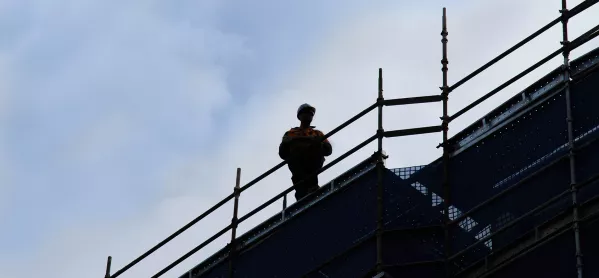RAAC: At-risk schools in dark over safety of buildings

Ministers have been warned that schools that suspect they have RAAC “cannot wait weeks” for guidance about whether their building should be deemed safe, amid a shortage of surveyors.
A union leader issued the warning after a list of urgent questions, sent to education secretary Gillian Keegan on Monday, remained unanswered.
School staff unions, including the NAHT school leaders union, the Association of School and College Leaders, the NEU teaching union, NASUWT, GMB and Unison, wrote to the Department for Education (DfE) after it changed its guidance for schools and called on those with confirmed RAAC (reinforced autoclaved aerated concrete) to close these buildings.
The DfE has this week named 147 schools where RAAC has been confirmed. More than 40 have had to delay the start of term or move some pupils to remote learning.
One of the main questions union leaders asked was what the DfE advice is for a school leader who is uncertain whether or not their building is safe?
NAHT general secretary Paul Whiteman has today said that schools cannot wait any longer for an answer. His comments come as a primary school in the West Midlands decided to close over suspected RAAC while it waits for a survey.
- RAAC: Unions ask how many schools have suspected cases of RAAC
- List: The DfE names schools where RAAC confirmed
- Warning: Concerns that DfE’s RAAC survey data is wrong
Mr Whiteman said: “There are a number of urgent time-critical questions that we have submitted to the DfE. Most pressing is the question of what schools should do if they have not been able to determine whether or not RAAC is present in their buildings.
“Given the shortage of surveyors available, that now becomes even more pressing. We cannot wait weeks for clarity on this. We need to know now. We are particularly concerned about those schools that are not in a local authority or MAT [mult-academy trust], many of whom could be lacking the support and advice they urgently need on this. We would urge the government to provide clear answers on this and quickly.”
Another joint union letter has been sent to the DfE today urging it to clarify how many schools there are with suspected RAAC.
Meanwhile, Woodhouse Primary Academy in Quinton, Birmingham, said it had taken the decision to switch to online learning for pupils as it could not completely ensure their safety.
The school’s letter to parents and carers of pupils, issued on Wednesday evening, said: “Following the letter that you received yesterday which explained that there was a possibility that there may be RAAC present in our school, we have been unable to establish the necessary reassurances that there is no RAAC present.
“Therefore, we cannot completely ensure the safety of everyone within the school building at this time.
“When we received the latest updates from the DfE around RAAC on 31 August 2023, we acted without delay to arrange surveys to provide us with definitive evidence that there was no RAAC present.
“These are in addition to our own condition survey that had already been completed in the summer term. Our survey identified that there may be some risk and we then commissioned the DfE survey.
“We are still awaiting a survey.”
Unanswered questions for the DfE
The union letter to Ms Keegan, sent on Monday, asked a series of urgent questions about RAAC, including how to deal with uncertainty over the safety of schools with suspected issues and how mitigation funding would be allocated. At time of writing, the government had yet to offer any response.
DfE guidance says that when RAAC is suspected in a school, the responsible body should inform the Department for Education via its Capital Portal to be added to the DfE Assessment Survey Programme.
Responsible bodies are also told that prior to further investigation by one of DfE’s contracted surveying companies, they are required to “gather and supply relevant information about your buildings and to list all spaces where additional measures will be required to enable the surveyors to see the surfaces clearly”.
In a section on key actions for affected settings, it says: “Please do all you can to make your setting available to be surveyed. Do not drill into, cut or disturb anything you think might be RAAC.”
The guidance adds that responsible bodies should make contingency plans in case RAAC is confirmed.
The DfE guidance does not include any recommendation for schools to close when suspected RAAC is found but not confirmed.
A DfE spokesperson said: “We are continuing to ramp up the surveys of suspected RAAC and where it is identified we are allocating schools with a case worker to help put in mitigations or temporary accommodation as quickly as possible.
“We are incredibly grateful to school and college leaders for their work with us at pace to make sure that where children are affected, disruption is kept to a minimum, and in the even rarer cases where remote learning is required, it is on average for a matter of days not weeks.”
You need a Tes subscription to read this article
Subscribe now to read this article and get other subscriber-only content:
- Unlimited access to all Tes magazine content
- Exclusive subscriber-only stories
- Award-winning email newsletters
Already a subscriber? Log in
You need a subscription to read this article
Subscribe now to read this article and get other subscriber-only content, including:
- Unlimited access to all Tes magazine content
- Exclusive subscriber-only stories
- Award-winning email newsletters



